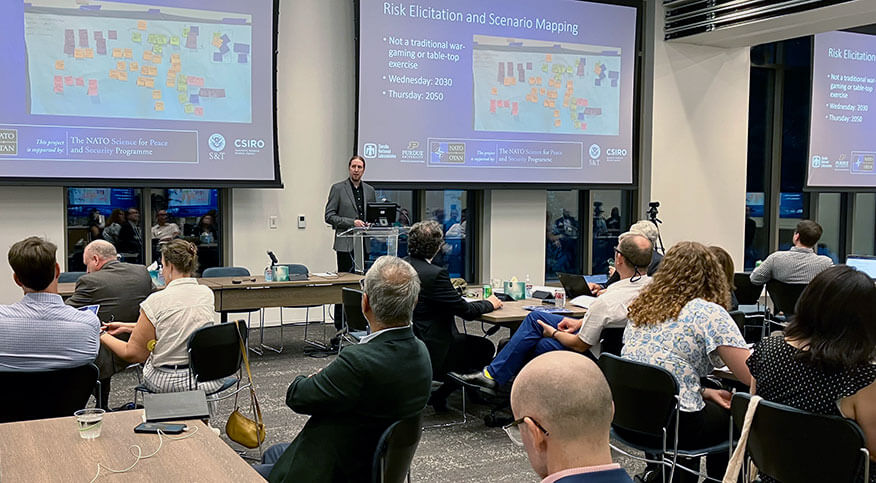ISF hosts global conference on security implications of climate change

WEST LAFAYETTE, Ind. — The Purdue University Institute for a Sustainable Future (ISF) recently led the organization and planning of a Washington, D.C., workshop involving the U.S., NATO and partner countries to anticipate and plan for potential impacts of climate change on water, food, energy, finance, cyber infrastructures and social-political institutions.
Titled Unraveling the Cyber-Physical Infrastructure Climate Change Nexus, the four-day workshop featured discussions and scenario-gaming exercises to explore myriad consequences of global warming. Participants, including experts from NATO and other countries, as well as U.S. specialists from the Department of Homeland Security and other federal agencies, examined ways to enhance resilience and adaptive capacity in response to emerging global challenges.
The event featured in-depth discussions on participants’ ongoing collaborations to examine the entire system of cybersecurity and essential infrastructure, including social-economic-political institutions, in addressing climate change.
“We’re really trying to think about the feedback and interactions among the system components and how to push the system so that it builds resilience, enhances adaptive capacity or facilitates growth rather than moving in the other direction as a system,” said Matt Huber, the David E. Ross Director of the Purdue Institute for a Sustainable Future and professor of earth, atmospheric, and planetary sciences. “The ISF’s role in this is critical not only because of our expertise in these areas but also due to our capacity to convene and converge expertise across the university as well as through our relationships with federal labs and international organizations.”
Areas identified for future collaborative research include the development of strategies to collect and secure climate data and to create and defend resilient critical infrastructures. Plans also include advancing an integrated approach to food, energy and water security, and integrating heat-related threats into strategic-defense planning.
Workshop participants included David Alexander, senior science advisor for resilience at the U.S. Department of Homeland Security, and James Appathurai, NATO’s deputy assistant secretary general for innovation hybrid and cyber. Also participating were Purdue’s Center for Education and Research in Information Assurance and Security (CERIAS) and the Purdue Policy Research Institute. The leadership of ISF also worked with counterparts from Sandia National Laboratories and Australia’s Commonwealth Scientific and Industrial Research Organisation, Australia’s national science agency and innovation catalyst.
For more information, contact Matthew Huber at huberm@purdue.edu.
About Purdue University
Purdue University is a public research institution demonstrating excellence at scale. Ranked among top 10 public universities and with two colleges in the top four in the United States, Purdue discovers and disseminates knowledge with a quality and at a scale second to none. More than 105,000 students study at Purdue across modalities and locations, including nearly 50,000 in person on the West Lafayette campus. Committed to affordability and accessibility, Purdue’s main campus has frozen tuition 13 years in a row. See how Purdue never stops in the persistent pursuit of the next giant leap — including its first comprehensive urban campus in Indianapolis, the Mitch Daniels School of Business, Purdue Computes and the One Health initiative — at https://www.purdue.edu/president/strategic-initiatives.
Source: Matthew Huber, huberm@purdue.edu